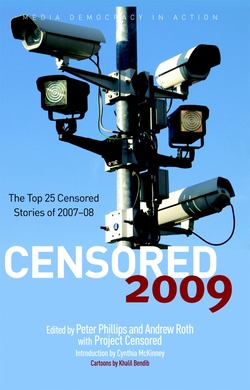The new and improved "Censored," detailing the top censored stories and media analysis of 2020.
Our nation's oldest news-monitoring group, Project Censored, refreshes its longstanding yearbook series, Censored, with State of the Free Press 2021. This edition offers a more succinct and comprehensive survey of the most important but underreported news stories of 2020; in addition to a comparative analysis of the current state of corporate and independent news media, and its effect on democracy. The establishment media sustains a decrepit post-truth era, as examined the lowlight features: "Junk Food News"-frivolous stories that distract the public from actual news-and-"News Abuse"-important stories covered in ways that undermine public understanding. The alternative media provokes a burgeoning critical media literacy age, as evaluated in the highlight feature: "Media Democracy in Action"-relevant stories responsibly reported on by independent organizations. Finally, in an homage to the history of the annual report, the editors reinstate the "Déjà vu News" feature-revisited stories from previous editions. State of the Free Press 2021 endows readers with the critical thinking and media literacy skills required to hold the corporate media to account for distorting or censoring news coverage, and thus, to revitalize our democracy.
Collected in
NEW RELEASESWe're at a critical moment in the history of journalism. While the COVID-19 pandemic has exacerbated the myriad crises plaguing the news industry over the past decade, crucially, this moment provides an opportunity for the news industry to radically change in the people's favor. Enter Project Censored's State of the Free Press | 2022.
To celebrate the publication of this important book, we are proud to share Danielle McLean's foreword to Project Censored's State of the Free Press | 2022, this year's edition of PC's annual project, which Noam Chomsky describes as "a crucial contribution to the hope for a more just and democratic society." In this passage, the author describes the last decade's effects on the news industry, the hurdles facing journalists in 2022, and the importance of watchdog journalism in a time of unprecedented corporate media consolidation.
Foreword to Project Censored's State of the Free Press | 2022
by Danielle McLean
At their best, journalism and those who practice it have kept the powerful honest, held elected officials accountable for their actions and abuses of power, and revealed the complex causes of and solutions for societal ills such as poverty, housing insecurity, inequality, and public health crises.
But the state of the free press is in turmoil.
Yes, anti-democratic world leaders and their oligarch cronies vilify the media while trying to shield the public from truth and maintain a grip on power. But perhaps the biggest threat to the free press in the United States comes from inside it: the hedge funds such as Alden Global Capital and the corporate boards of other large media conglomerates that run so many newsrooms.
Since the new millennium, print publications have struggled to monetize a transition from paid advertisements and subscriptions to free internet stories adorned with ads that bring in a fraction of the revenue. For years, too many news organizations tried to chase whatever advertising dollars they could through clickbait headlines and stories that failed to find an audience or deliver high-quality journalism. Meanwhile, internet giants like Facebook and Google leeched news outlets’ hard work by capitalizing off news articles posted online and not offering fair compensation to publishers in return.[1] The pandemic only worsened the situation.
According to an analysis by the Pew Research Center, newsroom employment declined 23 percent between 2008 and 2019.[2] That includes many behind-the-scenes staff as well as thousands of investigative, policy, city hall, and statehouse reporters, video operators and editors, copyeditors, and photographers. The pandemic has decimated newsrooms even further, as the Poynter Institute has been documenting with constant updates about staff layoffs and furloughs.[3] And huge media companies that own large collections of local and daily newspapers continue to consolidate into corporate giants or sell off their assets to hedge funds that are more than happy to cut newsrooms to the bare bone, sucking out whatever profit they can.
The dust still hasn’t settled from all this devastation, and nationwide local newspapers have been forced to close or slash their staffs to near nothing. Large swathes of the country are now served by one or no local newspapers—replaced by all of the misinformation, lies, and propaganda that are so easily disseminated online.[4]
The reporters who remain are working harder than ever to cover more than they ever have, sometimes with mandates to produce a certain number of stories, videos, and social media posts per day. Many get paid low wages while working long hours to meet their quotas and cover their beats with little time to really dig into complex issues. In uncertain economic times they are also regarded as expendable, and let go with scary regularity and no consideration for their personal struggles.
These conditions have forced reporters, often from underrepresented communities and lower socioeconomic backgrounds, out of the industry all too soon, terminating what could have been long and excellent careers. Making a bad situation worse, those reporters are often the ones best suited to understanding how laws, policies, and decisions by powerful corporations affect certain communities disproportionately. It’s no wonder that trust in traditional media is at an all-time low.[5]
According to the Society of Professional Journalists’s Code of Ethics, reporters should “be vigilant and courageous about holding those with power accountable” and give “voice to the voiceless.”[6] They should serve as watchdogs over public affairs and the government and make sure the public’s business is conducted in the open. They should also boldly “tell the story of the diversity and magnitude of the human experience” and seek “sources whose voices we seldom hear.” The conditions that reporters are forced to endure today tremendously complicate that task.
Project Censored’s State of the Free Press 2022 shines a spotlight on critical issues investigated by reporters who succeeded in providing essential watchdog journalism despite the odds against them. The book recounts important stories focused on systems, governments, and corporations that harm the less powerful—stories which often go unnoticed by the establishment press. It’s the kind of work news organizations must do to give democracy a chance.
We are fortunate that many nonprofit and alternative newsrooms throughout the country help to revitalize the news deserts that otherwise expand with each new merger or closure. However, those newsrooms can only do so much with minimal financial backing. Whether through new sources of public funding or philanthropy, reforms to antitrust laws, regulations that force Facebook and Google to properly compensate the publishers they profit off of, or something not yet envisioned, newsrooms need our support.
In recent years some national news outlets have ramped up support for investigative teams that have done groundbreaking watchdog journalism. At a time when so few job opportunities for watchdog journalists exist, their work is more crucial than ever, and they should be commended. Yet, as isolated instances bucking the trend of an entire industry in decline, these teams can only do so much.
Sadly, too many of the media’s scarce resources are devoted to amplifying the voices of the country’s most powerful government officials and corporate executives, uncritically publicizing their opinions and short-term goals instead of exploring the collective impacts that their decisions might have on society and its most vulnerable members.
This needs to change. Our industry needs to change.
We need to stop chasing ratings and meaningless clickbait headlines, stop treating politics like celebrity gossip and elections like popularity polls, demand change from the corporate boards and hedge funds that run news outlets without caring about the free press, and turn our focus toward the kind of journalism that our society deserves. We need more of the kind of journalism you’ll find in this book.
DANIELLE MCLEAN is a senior editor at Smart Cities Dive, a national news outlet that provides in-depth journalism tracking the most impactful news and trends shaping cities and municipalities. She is also the chairperson of the Society of Professional Journalists’s Ethics Committee. She previously served as chairperson of SPJ’s Freedom of Information Committee.
Danielle is a former staff reporter at the Chronicle of Higher Education, where she covered federal and state higher ed policies. She is also a former investigative reporter at the Bangor Daily News and later ThinkProgress, writing about voter suppression, corruption, housing, poverty, and the impacts of federal and state policies, among a host of other issues. Her report on missing and murdered Indigenous women at ThinkProgress was selected as the top story in Project Censored’s State of the Free Press 2021.



































